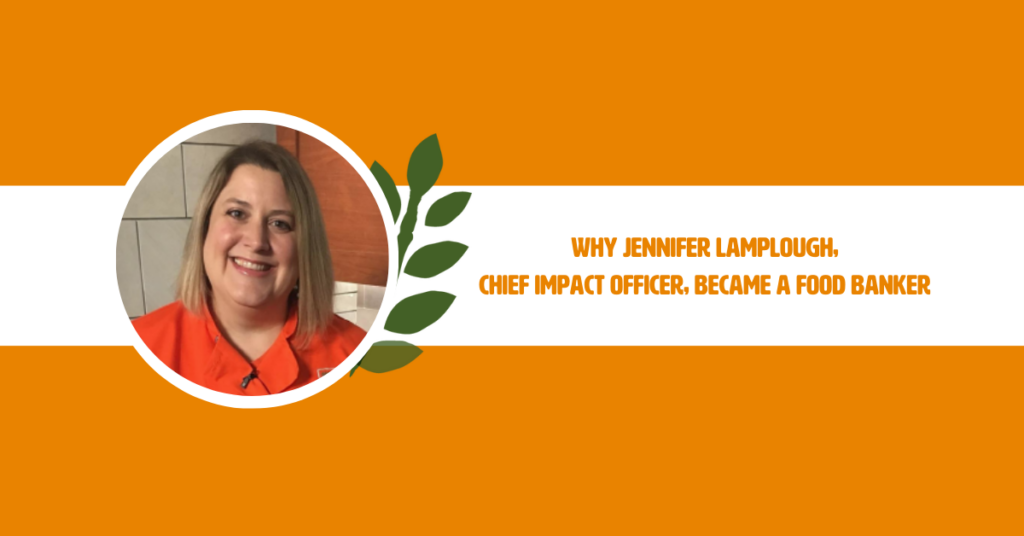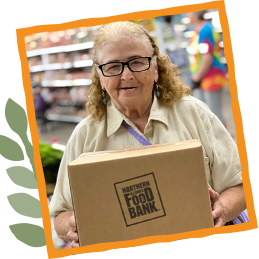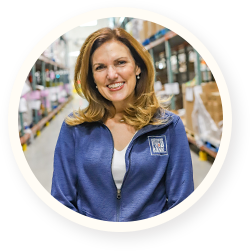
I became a food banker because I had a student named Terrence.
I was teaching culinary arts at a local college and Terrence was in the first class I ever taught.
Terrence was a terrible cook. Worse than terrible. Couldn’t follow a recipe. Didn’t know the
difference between broccoli and celery. Didn’t care about the fundamentals of hospitality, at all.
Day after frustrating day, I wondered why on earth Terrence was enrolled in a culinary
arts program.
One day I snapped at him when he presented me with what was supposed to be silky smooth
cream of asparagus soup and what I got was tepid vegetable broth with three charred pieces of
asparagus in it. “Terrence!” I barked, pushing his bowl of whatever-that-was away from me,
“Why are you in this program? You clearly can’t do this and don’t even try that hard!”
He hung his head in shame and told me it was because he knew he would eat.
Gut punch.
Terrence didn’t have enough food to eat growing up, and still didn’t as a young adult. He was on
scholarship and knew if he enrolled in culinary, he would eat each day.
He knew he would eat.
Those words haunt me to this day and cause shame to boil inside me at the way I treated him.
I made assumptions and judgements about him and was endlessly frustrated with him and his
performance in class because I thought he just didn’t care.
I looked around my class and saw a lot of Terrences. I vowed that day to teach them all to cook if
it killed me. I wish I could say Terrence turned a corner, became a great cook and graduated with
honors. Sadly, like many college students out on their own, he couldn’t afford to stay in school,
even with scholarships to cover tuition.
I didn’t officially become a food banker until 11 years later when I joined the team at
Northern Illinois Food Bank. I didn’t even know what a food bank was back then. Lucky for
me, right?
In my heart, though, I became a food banker in that moment and I vowed to help each student
learn to earn a better living if they could. Learn how to cook a good meal for their families. Learn
that I was there for them and that I would pretend to be busy so they could wrap up the leftovers
from class that they were supposed to throw away for “liability reasons.” Learn that they mattered and that there is no shame in admitting needing help. Learn that some people do care, and
won’t judge you because you can’t make ends meet.
Right now, the need for food is astronomically high. We are serving more people each month now
than we were at the height of the pandemic. You can read endless articles and research about
how high that need is and how hard it is to get enough food to feed everyone. It’s real, and
it’s tragic.
Food. A fundamental human right. Not a luxury. Imagine fighting every day to figure out how you
are going to put food on the table. Imagine waiting in line for hours to get a couple of bags of
groceries just to be able to pack your kid’s lunch. Imagine getting tears in your eyes because you
were able to get fresh grapes at the food pantry. Imagine having to decide to waste your
scholarship on a program you don’t even like just so you know you’d eat. Imagine. Can you even?
I can because I’ve seen it.
You don’t have to work at a food bank to become a food banker. It’s really easy, actually. Donate
money. Donate food. Donate time. Don’t make assumptions about people. Believe them when
they say they need help and don’t make them prove it.
Want to become a food banker today? Click the link below to donate to Northern Illinois Food
Bank and help us ensure every neighbor of ours…yours…has the food they need to thrive.
IT’S HARD TO ASK FOR HELP, BUT IT’S REALLY EASY TO GIVE IT.






